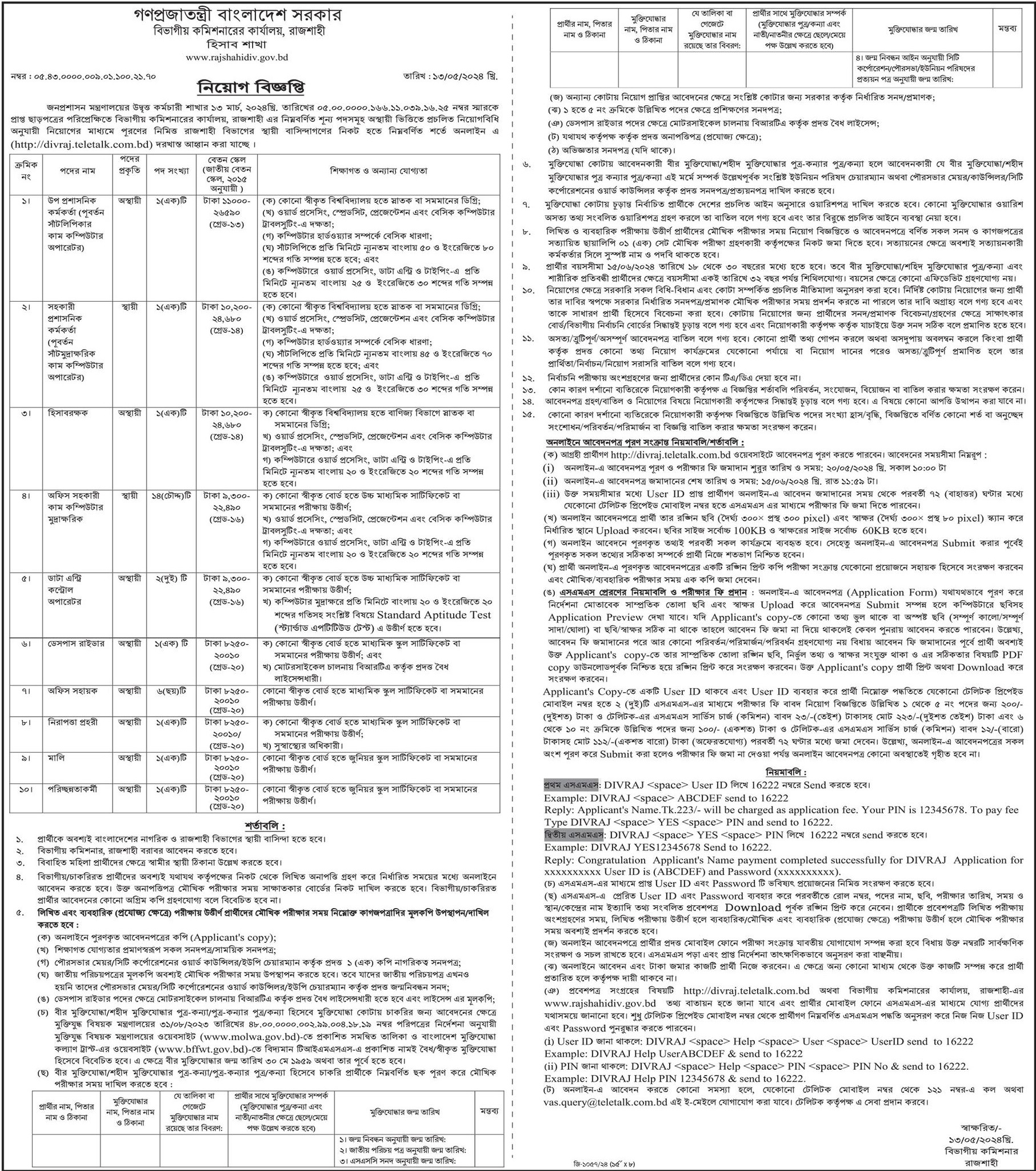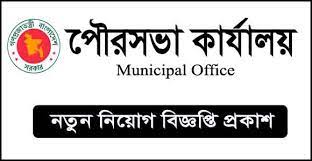Office of the Divisional Commissioner, Rajshahi
বিভাগীয় কমিশনারের কার্যালয়, রাজশাহী
Job Category: Govt. Job
Job Source: বাংলাদেশ প্রতিদিন
Posted On: 16 May 2024
Application Deadline:15 Jun 2024

Apply
Welcome to our website bangladeshtodays.org. This is the best website online. Here you will get daily updates on all types of job news such as: E.g Job Vacancies in Public Sector, Private Sector, Corporate, Banking, NGO Jobs etc. You can select any type of job from the category option in the top menu of the website. You can apply for jobs directly on our website. There is a search option at the top of this website where you can search for jobs according to your requirements. If you have benefited even in the slightest from our website, then you can tell your friends, family and everyone else about this website. I hope you also benefit from this website. You can share this website post on Facebook, Instagram, Twitter or any other online platform if you want. Many people can benefit from your sharing. And if there is anything you want to know or understand, you can contact us by email on the contact page of this website. We will try our best to help you, thank you very much.
Title: Steering Governance: Exploring the Office of the Divisional Commissioner
Introduction:
The Office of the Divisional Commissioner stands as a pivotal institution within the administrative framework of many countries, responsible for overseeing governance, coordinating development initiatives, and ensuring efficient service delivery at the divisional level. This comprehensive examination delves into the history, functions, challenges, and impact of the Office of the Divisional Commissioner in promoting effective governance, fostering development, and addressing regional disparities.
Historical Background:
The concept of the Divisional Commissioner’s Office traces its roots to colonial-era administrative structures, where commissioners were appointed to supervise administrative affairs and maintain law and order in territorial divisions. Over time, the role evolved to encompass broader responsibilities related to development planning, revenue administration, and coordination of government departments at the divisional level. Today, the Office of the Divisional Commissioner serves as a linchpin of decentralized governance, facilitating the implementation of policies, programs, and initiatives to address local needs and priorities.
Functions and Responsibilities:
The Office of the Divisional Commissioner assumes a diverse array of functions and responsibilities aimed at promoting effective governance, ensuring public service delivery, and fostering regional development. Some of the key roles and responsibilities include:
1. Administrative Oversight:
– Providing administrative oversight and supervision to government departments, agencies, and local bodies operating within the divisional jurisdiction.
– Monitoring compliance with laws, regulations, and policies to ensure transparency, accountability, and adherence to legal standards in governance.
2. Coordination and Collaboration:
– Facilitating coordination and collaboration among government departments, district administrations, and local authorities to streamline development planning, resource allocation, and implementation of programs and projects.
– Convening meetings, workshops, and stakeholder consultations to foster dialogue, consensus-building, and synergy in governance processes.
3. Development Planning and Implementation:
– Coordinating the formulation, implementation, and monitoring of divisional development plans, strategies, and projects to address regional disparities, promote inclusive growth, and enhance the quality of life for residents.
– Mobilizing resources, leveraging partnerships, and advocating for investments in infrastructure, social services, and economic development initiatives within the division.
4. Crisis Management and Disaster Response:
– Serving as the focal point for crisis management, emergency preparedness, and disaster response efforts within the division, coordinating with relevant authorities to ensure timely and effective interventions during natural disasters, public health emergencies, and other crises.
– Conducting risk assessments, developing contingency plans, and enhancing community resilience to mitigate the impact of disasters and safeguard lives and livelihoods.
Challenges and Considerations:
Despite its pivotal role in governance and development, the Office of the Divisional Commissioner faces a myriad of challenges and considerations that impact its effectiveness and efficiency. Some of the notable challenges include:
1. Institutional Capacity and Resources:
– Limited institutional capacity, staffing shortages, and resource constraints may hinder the ability of the Divisional Commissioner’s Office to fulfill its mandate effectively, leading to gaps in service delivery and coordination.
– Strengthening human resource capacity, enhancing technical expertise, and investing in infrastructure and technology are essential to bolster the operational efficiency of the office.
2. Interagency Coordination and Collaboration:
– Fragmentation, turf battles, and lack of trust among government departments and agencies may impede interagency coordination and collaboration, hindering the implementation of integrated development strategies and programs.
– Promoting a culture of cooperation, fostering mutual respect, and incentivizing collaboration through shared goals and outcomes can enhance interagency synergy and effectiveness.
3. Governance and Accountability:
– Ensuring transparency, accountability, and integrity in governance processes is paramount to building public trust and confidence in the Divisional Commissioner’s Office.
– Strengthening oversight mechanisms, promoting citizen participation, and embracing principles of good governance, including openness, responsiveness, and inclusivity, are essential for enhancing accountability and legitimacy.
4. Socioeconomic Disparities and Inequities:
– Addressing regional disparities, socioeconomic inequities, and marginalized communities’ needs requires targeted interventions, inclusive policies, and equitable resource allocation.
– Adopting a place-based approach to development, tailoring interventions to local contexts, and empowering communities to participate in decision-making processes can help bridge gaps and promote inclusive growth.
Impact and Community Engagement:
The Office of the Divisional Commissioner plays a transformative role in steering governance, fostering development, and promoting community well-being within its jurisdiction. Its impact extends beyond administrative functions to encompass broader community engagement, empowerment, and socio-economic transformation. By fostering partnerships with civil society organizations, private sector actors, and community stakeholders, the Divisional Commissioner’s Office enhances its effectiveness in addressing local needs, mobilizing resources, and leveraging collective action for sustainable development.
Conclusion:
In conclusion, the Office of the Divisional Commissioner occupies a central position within the governance architecture, serving as a catalyst for development, coordination, and service delivery at the divisional level. Despite facing challenges, the office remains steadfast in its commitment to promoting effective governance, fostering inclusive development, and addressing regional disparities. By embracing innovation, collaboration, and community engagement, the Divisional Commissioner’s Office continues to play a vital role in advancing the public good, enhancing quality of life, and building resilient, prosperous communities.

